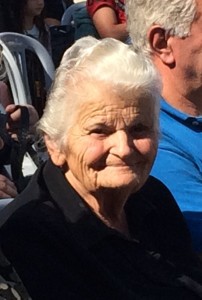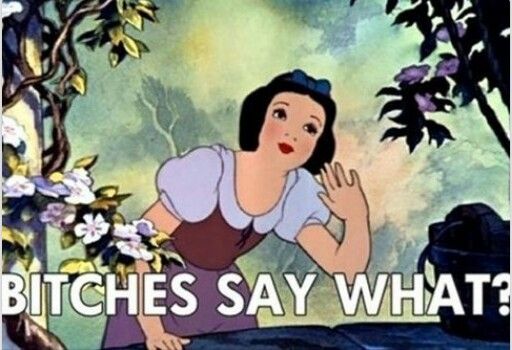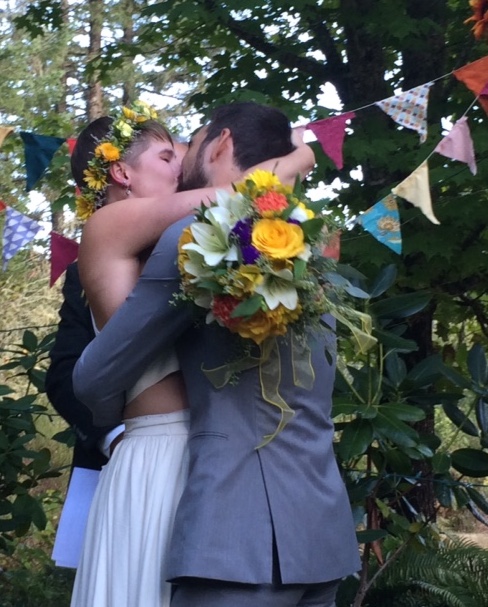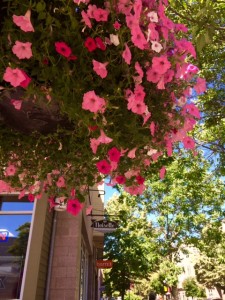Category — Life
Fear. Hope.
I am afraid of what he will do, a man full of anger and ego, a man who lashes out, who mocks and bullies, a man who respects no one, a man who has never served our country in any capacity.
I am afraid that he deeply deeply misunderstands what being “great” means.
I am afraid of the damage he can easily inflict, and has promised for the last 18 months that he will: the obliteration of the Affordable Care Act; the nomination of a Supreme Court justice – undoubtedly two, maybe even three – that could make the overturning of Roe v Wade a reality; a retreat from any attempts to deal with climate change, which he has publicly declared is a Chinese scam to weaken us; the passage of xenophobic, Draconian immigration policies that destroy the heart and soul of what does, in fact, make American great. And I could go on.
He is a bombast, a loose cannon, a cheater who has gotten away with it, who has in fact become a billionaire doing it, and has now become the next President of the United States doing it.
But more than anything else, I am afraid of us, of my fellow Americans, the millions and millions of people who voted for this man, who listened to him make fun of the disabled and brag about his sexual exploits and call Mexicans rapists and crooks and promised to close our borders to all followers of Islam, a man who embodies the worst of us, the most fearful, selfish, angry worst of us.
And yet, at the same time, I trust my tribe, my millions-member, cross-continental, multi-generational, multi-cultural tribe of forward-looking, diversity-embracing, open-hearted women and men who will do what we do, what we know how to do, what we have been doing, what we must now do with greater commitment: Work with rekindled energy and overarching kindness to make our communities safe and welcoming, help those who need help, protect those who need protection, embrace and learn from those who want to be a part of us and add to the richness and texture of our culture. I trust my tribe who believe in and live the precepts of social justice. I trust that, after we have absorbed this shock, after we have cried and hugged each other and talked through our fears, we will carry on, with renewed vigor, with fierce love, with unshakeable commitment. Because this is what makes America great.
November 9, 2016 4 Comments
Lessons learned from a 3000-year-old olive tree
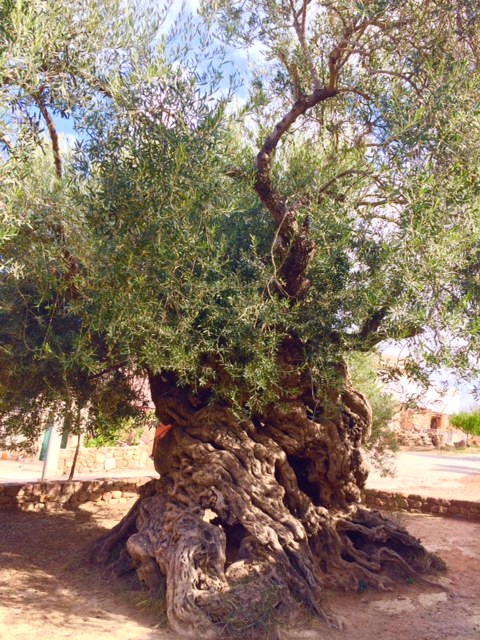 In Vouvres, a village in the mountains of western Crete, there stands an olive tree that is verifiably 3000 years old. When this tree was a sapling, the Iron Age had just begun. The tree is magnificently gnarled, a twisting, turning, ropey, veiny, sinewy work of art that manages to seem both fluid and solid at the same time. Its circumference measures 41 feet. Branches, so many branches, some old and thick, some young and slender, all healthy, all dusty green with leaves, all bearing olives, grow from its massive trunk.
In Vouvres, a village in the mountains of western Crete, there stands an olive tree that is verifiably 3000 years old. When this tree was a sapling, the Iron Age had just begun. The tree is magnificently gnarled, a twisting, turning, ropey, veiny, sinewy work of art that manages to seem both fluid and solid at the same time. Its circumference measures 41 feet. Branches, so many branches, some old and thick, some young and slender, all healthy, all dusty green with leaves, all bearing olives, grow from its massive trunk.
I stood before this tree last week. I couldn’t get enough of it. I walked around and around it. I photographed it from all sides. I peered inside its dark, hollow core. I touched it. I (embarrassingly) spoke to it.
Not out loud.
Okay, sort of out loud.
I asked it to reveal its secrets. How do you survive for three millennia? How do you persevere through all that has come your way? How do you stay so strong, so healthy, so magnificent?
And this is what the Monumental Olive Tree of Vouvres (its official name) told me (not out loud):
**Situate yourself in a place that suits you and grow your roots deep.
**Bend when you have to.
**Be useful
**Give back not just to those who care for and tend you, but to all.
**Keep pushing out new branches. Always push out new branches. Never stop growing.
**And remember the true beauty of age, the complexity and richness, the layering of experience upon experience, the strength and power that comes from that.
“And lady,” the tree said to me, “it’s time to quit talking to trees. Take a hike in the hills. The sun is shining. The bougainvillea is blooming. The air smells like thyme and basil and lavender. Go.”
And so I did.
November 2, 2016 5 Comments
Old and NOT in the way
 Among the many differences between life in Europe and life in the U.S., one of the most consistently startling to me is how many old people you see…everywhere: behind counters in the shops, rolling out dough in bakeries, strolling on the streets, waiting for buses, shopping in grocery stores, socializing in cafes, sitting on benches and reading the newspaper, enjoying concerts. In other words, they are a visible part of their community. A normal part of everyday life. This woman, In Rethymnon (Crete) and her husband own a phyllo bakery. They are in their 80s.
Among the many differences between life in Europe and life in the U.S., one of the most consistently startling to me is how many old people you see…everywhere: behind counters in the shops, rolling out dough in bakeries, strolling on the streets, waiting for buses, shopping in grocery stores, socializing in cafes, sitting on benches and reading the newspaper, enjoying concerts. In other words, they are a visible part of their community. A normal part of everyday life. This woman, In Rethymnon (Crete) and her husband own a phyllo bakery. They are in their 80s.
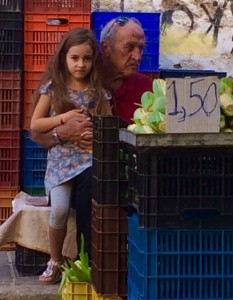 This man sells produce from his farm at the Minoos Market (Chania, Crete) every Saturday. His granddaughter — or it could be his great granddaughter — comes to help. When I bought tomatoes from him, he guided her to make the correct change for me.
This man sells produce from his farm at the Minoos Market (Chania, Crete) every Saturday. His granddaughter — or it could be his great granddaughter — comes to help. When I bought tomatoes from him, he guided her to make the correct change for me.
This 90-year-old woman, a resident of Elos, in the mountains of western Crete, is sitting out on a sunny day enjoying the festivities of the town’s annual chestnut festival. In between the rousing music and traditional dancing (she taps her feet and nods her head), she chats with family and passersby. When I asked if I could take her picture, she laughed and patted my arm.
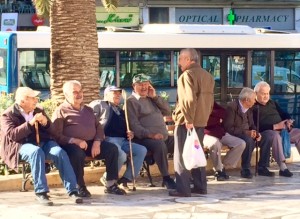 These guys are sitting on sunny bench outside the Agora, Chania’s central marketplace. I sat and watched them for almost half an hour as they chatted, laughed, argued, called out to friends who passed by and generally looked like they were enjoying the morning and each others’ company. And — a big and here — being out in the community, feeling part of the vibrant life of this small city.
These guys are sitting on sunny bench outside the Agora, Chania’s central marketplace. I sat and watched them for almost half an hour as they chatted, laughed, argued, called out to friends who passed by and generally looked like they were enjoying the morning and each others’ company. And — a big and here — being out in the community, feeling part of the vibrant life of this small city.
I think of the difference between the lives these older people live and the ones lived in the US by the elderly (and not even old old, but just retirees in their 60s and 70s). The healthy post-retirement Americans, many of them, are opting to live in gated communities among their own kind, in secluded enclaves, no longer a vital part of their families or of a multi-generational culture. Our healthy older people go to retirement “villages” that are not villages at all. Our unhealthy elderly are warehoused in nursing homes.
We will never defeat ageism if we don’t live together, if older people do not publicly and actively participate in their communities, if young people don’t see and know and interact everyday with older people.
October 26, 2016 7 Comments
Bitch
I get why Secretary Clinton (I refer to people by their first names only if I know them. Or if they are Madonna) did not initially disclose her bout of pneumonia.
It’s not just that she’s a “private person,” as her aides and confidants say. It’s that she knows, boy does she ever know, that women are just not allowed to be fallible the way men are. If a woman gets sick, she is showing weakness. If a man gets sick, well, he gets sick. And look at how strong he was to keep working while he was sick! What stamina! And look at how he bounces back! What resilience!
This is not the HRC story. Here’s what’s trending (as they say): Look, she stumbled! Watch the video. Now watch it again. She had to be held up by secret service guys! Poor sickly lady. Is she too frail to be the president? Because, you know, women are frail creatures. If you discount all the medical evidence that shows women are constitutionally stronger than men, have fewer illnesses and live longer. So she’s that kind of frail.
Secretary Clinton has a case of pneumonia. Pneumonia is an incredibly common disease. It’s all around us. The reason most of us don’t catch it is because our immune systems kick in and beat it before it has a chance to take up residence in our lungs. Secretary Clinton’s immune system was busy handling not just the killing schedule of a presidential candidate and the grind of nonstop travel and public speaking and photo opping – that’s par for the course. We expect her (and the others) to handle that.
Her immune system was being assaulted by the added stress, the extraordinary burden, of being the most powerful and successful female political leader of her (any) generation. Of being the one with everything to lose (unlike Misters Trump and Sanders…who both had/have everything to gain). It is the internalized stress that comes from being called a bitch and having to pretend that doesn’t hurt. Of being criticized for not smiling. Seriously? When did that become a thing? Oh, I know: When a woman became the leading candidate.
And now, she is being criticized for not immediately disclosing the fact that she caught a (generally) easily cured common illness…while the other candidate skates along without disclosing his federal income taxes. Or, let’s see, his national security policies.
Women have to be better to be equal. Every woman alive today knows that. You have to be tough to be taken seriously. But if you’re tough, you’re a bitch. You can’t show emotion – PMS, anyone? – but if you don’t, you’re a bitch. If you’re not assertive, you’re timid. If you’re too assertive, you’re…yep, a bitch.
Secretary Clinton is a bitch with a lung infection. I hope the lung infection clears up soon. I hope she continues being a bitch.
September 14, 2016 3 Comments
I carry your heart
There’s nothing like being in the presence of two people who are deeply, truly, honestly in love to open your own heart.
There is nothing like being in the presence of two people who manage to be both dizzyingly in love and clear-eyed about it, whose passion is fueled by compassion, to open your own heart, to bring you back to what you’ve not so much forgotten but have learned to take for granted.
September 7, 2016 1 Comment
What state are you in?
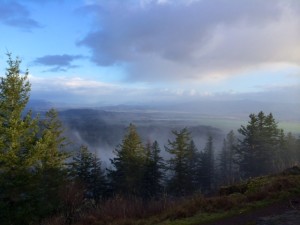 States in which I want to permanently dwell:
States in which I want to permanently dwell:
state of Wonder. You know…that state we lived in as children (or, later, for brief moments, on hallucinogens): wide-eyed, breathless, astonished, amazed, in awe. Ever curious. Senses keen. Alert to both the ordinary and the extraordinary. That state of simple transcendence, which is not simple at all, when all you can do is shake your head, silently marvel, breath deep and – if you are like me – forcefully hold yourself back from tweeting it out.
Recent travels in the State of Wonder: Watching Simone Biles on the vault. Reading Norman Maclean. Again. Listening to Astral Weeks Live, in the car, on the way to a solitary week at the beach. Staring out the mesh ceiling of the tent at a sliver of a moon, a cool breeze off the Willamette.
state of Being. You know…just being. Not planning, thinking, remembering, worrying, evaluating, catastrophizing, fantasizing. Not reading, running, baking, writing, doing laundry. Just being. That I-am-totally-present-in-the-moment state that coincides with residency in the state of Wonder — and from which you exile yourself the moment you start instagramming that moment. I speak from experience. Too much experience.
state of Acute Fluency. Given that I am much better at doing than I am at being, I find meaning and delight in the state of Acute Fluency. Ever hear of it? It is when you are happily immersed in the act of creation or exploration, deep in an almost trance-like mental state that is both taxing and blissful. Fully engaged, wholly focused. The joy is intensified by a sense that time has been suspended. Also known as: in the zone. Also known as: The Flow (as per the Hungarian psychologist Mihaly Csikszentmihalyi)
state of Oregon. Yes, finally, an actual geographic state: land of feathery gray mornings and cool summer evenings, of misty autumns, soggy winters and blindingly green springs. Land of blackberries and Bernie lawn signs (yes, still), of drivers who let you in traffic (really), of #iadoregon.
August 10, 2016 2 Comments
Time, fast and slow
Time keeps on slippin’ slippin’ slippin’/ Into the future.
Yeah, what’s that about?
Why does time seem to speed up the older we get? Why did 8 weeks at summer camp when I was 12 seem like a lifetime, and last year – a full year – go by so quickly I barely registered its passing.
Time is weird, right? We have long striven to measure it with exactitude (from sundials to atomic clocks), but we all know the folly of objective time. Time is not objective. It is subjective. Time is experienced. Time is perceived.
And it turns out we experience and perceive it at a faster clip the older we get. Why? And what can we do to slow it down?
Our friends the neuroscientists have answers to both questions.
Our perception of time, how we experience (and remember) time, is dictated by how much information our brains need to process. When we feed the brain more information and expose it to more stimuli, the moment (the day, the summer) seems to last longer. We perceive it as passing more slowly. It is when we are bombarded with new experiences, and our brains are flooded with stimuli (that is, when we are younger, when every day presents a new experience), that we perceive time as moving slowly.
But, as neuroscientist David Engleman says (in a New Yorker profile): The more familiar the world becomes, the less information your brain writes down, and the more quickly time seems to pass. Or look at it this way: A mundane activity, a routine, gives us no new interesting stimuli to process. So when we look back on that moment (year), we can’t remember it distinctly, and we perceive it as zipping by.
You see where this is going, right? I have written so much about taking on new challenges, raising the bar on your own life, pushing yourself out of your comfort zone. It turns out that all this is not just a fun, exciting and productive way to live life, it also slows time. You are feeding your brain more new stimuli to process. Doing something new means your brain has to pay attention. When it pays attention, your perception of time is altered.
Time does not keep on slippin slippin slippin away.
July 20, 2016 No Comments
not-so Truisms
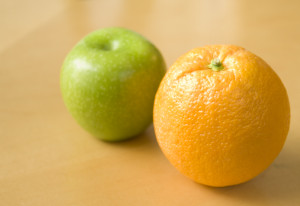 I’ve been thinking about our dependence on tried-and-truisms that are actually, if we stop to think about them, just bad advice wrapped in clichés.
I’ve been thinking about our dependence on tried-and-truisms that are actually, if we stop to think about them, just bad advice wrapped in clichés.
Here’s a few I question – and soundly reject:
Take baby steps.
Absolutely not! Be audacious. Take big bold steps. Lengthen your stride, especially when you’re feeling the most timid. One giant step really can lead to another giant step.
Play to your strengths.
Really? Why would you want to do that? You already know how to do that. You’re already good at that. Why not play to your weaknesses? Why not explore those underdeveloped parts, open some doors you’ve never opened?
If it ain’t broke, don’t fix it.
Seriously? You mean don’t dream up cool new things just because the old things are working okay? Don’t tinker and fiddle? So, speaking as a writer, does this mean if the prose is serviceable, don’t mess with it. I. Don’t. Think. So.
Write what you know.
If this is meant as a warning to not write from a position of ignorance, then sure. If this is an invitation to write about only what you’ve personally experienced and understand at the moment, I reject it! Writing about what you don’t already know means you have to go learn about it, research it, think about it, stretch yourself to understand what you don’t already understand. So write what you don’t know. Think and write yourself into a place of knowing.
This next one is not bad advice, just a cliché I hate so much that I’m going to grab this opportunity to rant about it:
That’s like comparing apples to oranges.
This is supposed to mean that the two things being compared are so different that a comparison is ridiculous. Actually, the saying is ridiculous. It’s pretty easy to compare apples and oranges. Fruit. That grows on trees. Spherical. Little seeds you spit out. Makes good juice. Lunchbox favorites.
The idiom is not unique, but other languages are more inventive in their “don’t compare” comparisons. My favorite is the Serbian expression: “That’s like comparing grandmothers to toads.”
In case you’re interested (and even if you’re not), this metaphor for dissimilarity began as “apples and oysters,” first published in 1670 in a collection of proverbs.
So there.
I invite you to write in with your truisms that aren’t.
July 6, 2016 No Comments
Ups and Downs
That’s what we say, to others or to ourselves, when the shit hits the fan, when life unexpectedly slaps us upside the head. But it works both ways, doesn’t it? Maybe whatever it was we didn’t see coming was a good surprise.
Like this morning, walking out of the Barre3 studio at 7:15. (That’s right, I took the 6:15 class. Uh huh, 6:15 in the morning.) So there I am exiting the downtown studio, already consumed with “to-do” thoughts, busy working out a schedule in my head, when I am slammed by what I would best describe as a Wall of Fragrance. Jasmine? Lily? Something so overwhelmingly, deliciously, perfumy that it stops me in my tracks. (It’s the enormous baskets of pink and white petunias hanging from the lamp posts. The ones I hadn’t even noticed before.)
I smile at the unexpected pleasure of it and move on… only to be stopped in my tracks, a few steps later, by another aromatic blast, this one coming from Noisette, the French bakery two doors down. It’s that baguettes-just-came-out-of-the-oven smell. You know the one. The one that gets the saliva spurting in the mouths of even the most committed of the gluten-free. And I smile.
I did not see that coming.
It’s good to remember that, amid the surprises we’d rather not experience – flat tires, sugar ants on the counter, adult acne, domestic infidelity — are the little pleasurable ones, the ones that sneak up on us, the ones we might ignore – or take for granted — because we are forging ahead, intent on checking off items on the list.
Oh god, please know this is not some vapid “take time to stop and smell the roses (petunias, baguettes)” message. It’s really about how it’s good to remember that there is a daily up and down rhythm to life. To be disappointed and then elated, weary and then energized, pissed off at the world and then all hakuna matata…that is what life is about, right? We’re restless, then content; disillusioned then hopeful; self-doubting, self-confident; snarky, saintly.
All these ups and downs stretch us in important ways. The daily rollercoaster promotes empathy, keeps us alert, keeps us learning and, I think, keeps us resilient. It’s a good thing. Or that’s just how I’m feeling at the moment. Hakuna matata.
June 29, 2016 5 Comments
Occupation or vocation?
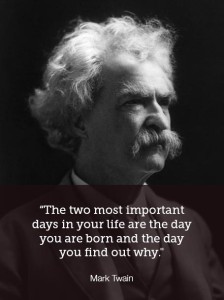 How do you spend your working hours – in an occupation or at a vocation? An occupation – something that occupies us or we occupy it — is employment. We do it because it makes use of our skills, because we were trained to do it, because at some point an opportunity presented itself and we took it and the path led in this direction, because it was what was available at the time, because it was what was expected of us, because the hours were good, because it paid well (or enough). We choose and occupy our occupations for all kinds of reasons, many of them good and sensible, but none of them from the heart.
How do you spend your working hours – in an occupation or at a vocation? An occupation – something that occupies us or we occupy it — is employment. We do it because it makes use of our skills, because we were trained to do it, because at some point an opportunity presented itself and we took it and the path led in this direction, because it was what was available at the time, because it was what was expected of us, because the hours were good, because it paid well (or enough). We choose and occupy our occupations for all kinds of reasons, many of them good and sensible, but none of them from the heart.
I am not saying that we don’t love our occupations. Many of us do. I’m not saying that we don’t bring our best game to work. Many of us do. I am saying that we don’t bring our deepest selves. Our deepest selves emerge when we are engaged in our vocation.
A vocation is what we do because we have to, because we were wired for it, called to it, because we don’t feel whole or truly ourselves unless we do it. That sounds high falutin’, I know. But I also know it’s true, whether one’s “calling” (the derivation of vocation…vocare, to call) is nursing the elderly or growing tomatoes or fixing cars.
Some people craft a life in which occupation and vocation are the same. I have tried hard to do this as both a writer and a teacher of writing. But the truth is, one is an occupation, and the other is my vocation. I bring energy, commitment and creativity to both. I learn and grow from both, and my goal is for others to also learn and grow.
But it’s clear where my heart lies, where my deepest self is engaged. Years ago I took a full-year sabbatical from my teaching position, and the absence of teaching did not leave a hole in my life. I felt just like me, only not teaching. But during those down times between writing projects when I am not actively working on something, I feel not quite me, not quite whole, untethered. My brain doesn’t work as well. My focus isn’t as sharp. Things are not quite okay even when everything else in my life is just fine. Maybe it’s this simple: Writing is who I am; teaching is what I do.
What are you doing when you are the most deeply engaged? Are occupation and vocation different for you?
June 22, 2016 2 Comments


